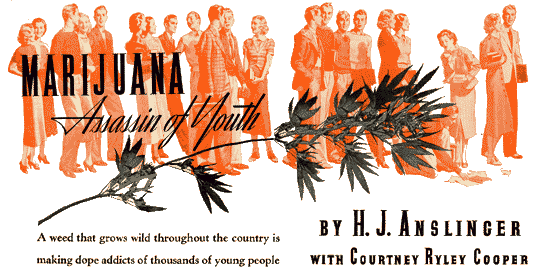Social Construction of Drug Problems
Part 1. Harry Anslinger and the Licata Case
"Horror Stories" and the Construction of Deviance: The Licata Case
Societal definitions of drug problems are often popularized and reinforced by "horror stories"—dramatic accounts, either real or fabricated, that are offered as "typical" cases of the dangers of drug-related deviance. Through repetition and elaboration in the mass media, horror stories take on a reality of their own, irrespective of the historical facts or ideological foundations of the case (if, indeed, it occurred at all). A classic example of this definitional technique is the Victor Licata case, a multiple homicide that occurred in Tampa, Florida, on October 16, 1933, as it was told and retold by Harry S. Anslinger, Commissioner of Narcotics of the Federal Bureau of Narcotics. The exerpt below is from Anslinger's article, "Marijuana, Assassin of Youth," which appeared in 1937 prior to the passage of the Marijuana Tax Act that effectively prohibited the sale of marijuana in the United States. Anslinger repeated various versions of the following horror story countless times on radio, in speeches, and in testimony to Congress in support of the Tax Act. The Licata case was also mentioned in the notorious exploitation film, Reefer Madness.

It was an unprovoked crime some years ago which brought the first realization that the age-old drug had gained a foothold in America. An entire family was murdered by a youthful addict in Florida. When officers arrived at the home they found the youth staggering about in a human, slaughterhouse. With an ax he had killed his father, his mother, two brothers, and a sister. He seemed to be in a daze....
He had no recollection of having committed the multiple crime. The officers knew him ordinarily as a sane, rather quiet young man; now he was pitifully crazed. They sought the reason. The boy said he had been in the habit of smoking something which youthful friends called “muggles,” a childish name for marijuana....
As this is written, a bill [the Marijuana Tax Act] to give the federal government control over marijuana has been introduced in Congress... It has the backing of...the United States Treasury Department, including the Bureau of Narcotics, through which Uncle Sam fights the dope evil. It is a revenue bill, modeled after other narcotic laws which make use of the taxing power to bring about regulation and control.
However, there was no evidence that Licata had used marijuana at the time of the killing. Before standing trial, he was turned over to a psychiatrist for examination. The examining psychiatrist not only found that Licata was criminally insane, but that he had a history of insanity in his family and many of his relatives had been committed to mental institutions. In fact, the Tampa police had made an attempt to have Licata committed to an institution a year earlier (and a half year prior to his using marihuana), but his parents argued that they could take better care of him in their own home and he was remanded to their custody.
Licata was ultimately sentenced to the Florida State Mental Hospital, where he was diagnosed as suffering from dementia praecox (schizophrenia) with homicidal tendencies, and he was observed to be overtly psychotic. Licata eventually hanged himself while in the hospital in 1950. Hospital records do not blame either Licata's crimes or his lifelong mental illness on marijuana. In fact, marijuana is never mentioned. Yet, Anslinger and other anti-drug crusaders continued to misrepresent the Licata case and use it as a compelling horror story about the dangers of the "killer weed."